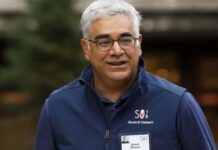
A potential coronavirus vaccine being developed in the U.K. prompted a strong immune response in an early trial, according to new research.
Experts from Oxford University detailed their findings in a study published Monday in the medical journal The Lancet. While the study authors cautioned that more research needs to be done, the vaccine produced an immune response in healthy people aged 18 to 55.
“The immune responses observed following vaccination are in line with what previous animal studies have shown are associated with protection against the SARS-CoV-2 virus, although we must continue with our rigorous clinical trial programme to confirm this in humans,” professor Andrew Pollard, chief investigator of the Oxford Vaccine Trial, said in a statement.
The Oxford researchers, who are partnering with drugmaker AstraZeneca, found no safety concerns from the vaccine. The trial, which started in April, involved roughly 1,000 people, half of whom got the vaccine. Participants who got the vaccine developed neutralizing antibodies, which researchers believe are important for protecting against the virus. Those who received two doses of the vaccine produced the strongest immune response.
“While there is more work to be done, today’s data increases our confidence that the vaccine will work and allows us to continue our plans to manufacture the vaccine at scale for broad and equitable access around the world,” Mene Pangalos of AstraZeneca’s biopharmaceuticals research and development department said in a statement.
The news comes shortly after Moderna announced positive emerging data from its COVID-19 vaccine trials. According to interim results from the vaccine’s phase one study, all participants developed neutralizing antibodies in response to the injections.
Moderna announced last week that the vaccine will begin its largest study, involving 30,000 people, on July 27. It is expected to be the first U.S. vaccine to enter phase three trials.
More than 100 coronavirus vaccines are currently in development, according to the World Health Organization, and more than 20 have started clinical trials.











